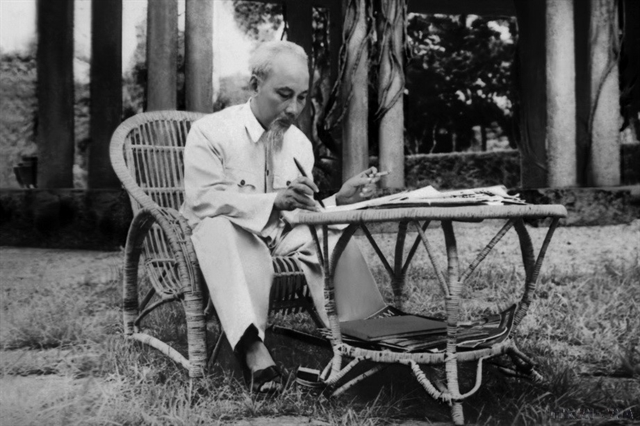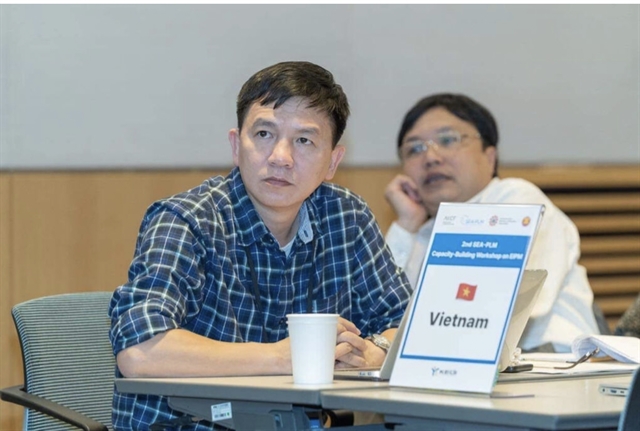.jfif) Opinion
Opinion


|
| Assoc. Dr. Phạm Quốc Khánh, vice director of the Department of Quality Management (Ministry of Education and Training). VNA/VNS Photo |
Assoc. Dr. Phạm Quốc Khánh, vice director of the Department of Quality Management at the Ministry of Education and Training, talks with Vietnam News Agency about changes in learning results after 10 years of participating in the Programme for International Student Assessment (PISA) and applying this assessment model to evaluate Vietnamese student capacity.
After 10 years of participating in PISA, what is Việt Nam’s latest performance?
Việt Nam has participated in the programme since 2012 and properly, fully and strictly implemented all Organisation for Economic Co-operation and Development (OECD) processes.
According to PISA 2022’s results, Vietnamese students scored close to the OECD average in mathematics, reading comprehensive and science ranking, 34 out of 81 countries and territories.
Việt Nam ranks 2nd in the ASEAN region after Singapore, and Vietnamese students have among the highest math scores in Asia, only behind Hong Kong, Taiwan (China) and South Korea, when calculated according to the PISA index of socio-economic conditions.
These results are consistent with OECD’s analysis on factors affecting results in its published reports.
PISA survey cycles have fluctuations in rankings, so Việt Nam has seen changes in results.
We are also very interested in in-depth analysis and evaluation to serve policy development and implementation. The country is actively developing a national report to analyse and compare PISA 2022 results.
The general change in PISA results through cycles is that the average scores of subjects have changed due to the addition and updating of assessment content to serve the goals set for each stage.
PISA 2022 results show Việt Nam has always been in the leading group in the ASEAN region, as well as in a high position among the group of middle-income countries and territories and around the average of the OECD countries.
PISA 2022 results decreased in overall rank. We initially evaluated some of the causes of this to implement the motto "temporarily stopping going to school, not stopping studying".
Organising online teaching in Việt Nam was a new thing for many schools, teachers and students, but not new to many developed countries.
The Ministry of Education and Training has directed the streamlining of content, keeping only the core part, guiding student assessments, and reducing supplementary lessons.
According to overall results published by the OECD, higher spending for education is associated with higher results in PISA’s mathematics. However, Việt Nam is a typical example of students achieving high academic results when investment in education is still modest. In your opinion, is this because Vietnamese students focus more on math?
Education spending per student aged 6-15 in Việt Nam is only about US$13,800 while in the OECD countries and territories, the amount is $75,000 but the average score in math of Vietnamese students is 438 points, one of the highest for students with similar socio-economic backgrounds.
OECD only announced this comparison in mathematics because PISA 2022 focuses on this subject.
In my opinion, there are many reasons for this result.
Education is considered a top national policy. Learning opportunities are available for children through a wide school network across the country with 97 per cent of students attending preschool education for one year or more as compared to 94 per cent of OECD average.
The learning programme is designed to provide middle school students with a solid foundation of knowledge in basic subjects such as math, science and Literature, so Vietnamese students score the OECD average.
In addition, mathematics is considered a strength of Vietnamese students through other assessments as well as many international Olympic competitions.
Therefore, Việt Nam’s mathematics results in this PISA 2022 basically reflect the quality of teaching this subject compared to other countries and territories in the region and the world.
Vietnamese teachers also focus on training logical thinking for students in the process of teaching math, as well as encouraging students apply diverse math solving methods helping them develop creativity and independent thinking.
Do you have any comments on the gap between students with the best learning conditions and those with the most difficulties? Is it true that Vietnam still has a lot to do to narrow this gap?
It is true that students with favourable socio-economic conditions outperform students from disadvantaged backgrounds in mathematics.
The average difference between the two groups is 78 points compared to 93 points in OECD countries. This not only happens in Việt Nam but also in many other countries and territories.
However, about 13 per cent of Vietnamese students from disadvantaged backgrounds scored high, in the top 25 per cent, as compared to 10 per cent in OECD countries.
Along with socio-economic conditions, there are other factors that affect learning outcomes. Therefore, the Ministry of Education and Training has been implementing synchronous and systematic solutions fitting each region to achieve equality in education access.
What does participating in the PISA survey mean for Việt Nam’s educational innovation? How have we applied the OECD assessment model to evaluate students?
PISA 2022 includes 81 participating countries and territories with at least 81 different middle school programmes.
Although many different sets of books and learning materials were used, the same competency assessment test of 120 minutes and 35 minutes asking about information related to students were applied.
The survey was organised scientifically and seriously to provide important data for policy development and implementation.
The education and training sector is implementing a project of developing a national wide-scale assessment system to meet the requirements of improving the quality and international integration of general education in the period 2022 - 2030, according to Decision 468/QĐ-BGDĐT dated February 13, 2023 issued by the Minister of Education and Training (known as Project 468).
The implementation of the project aims to periodically provide objective and reliable information about the quality of general education as a basis for proposing policies and solutions to innovate teaching and learning activities to meet the requirements of implementing the Programme of General Education 2018.
The fact that Việt Nam will continue to participate in PISA 2025 shows commitment and consistency in goals and the significance of participating in large-scale assessments of Project 468.
In recent years, we have also applied the OECD assessment model to evaluate Vietnamese students.
The Department of Quality Management is still implementing training on how to apply PISA assessment to improve the capacity of management and teachers.
The training sessions have helped managers and teachers apply PISA assessment methods at the local level, as well as innovate test questions in the direction of developing students’ capacities.
PISA's assessment techniques and methods have many outstanding advantages and are consistent with the trend of assessing learners’ capacities set in the 2018 General Education Programme, contributing to improving general education quality and international integration. VNS

|
| A student in an online class during the COVID-19 pandemic. VNA/VNS Photo |




